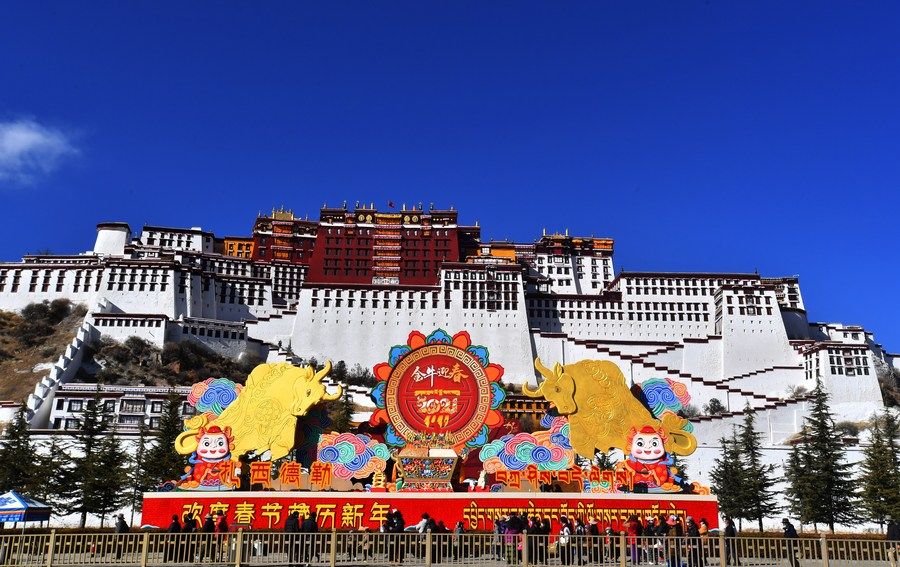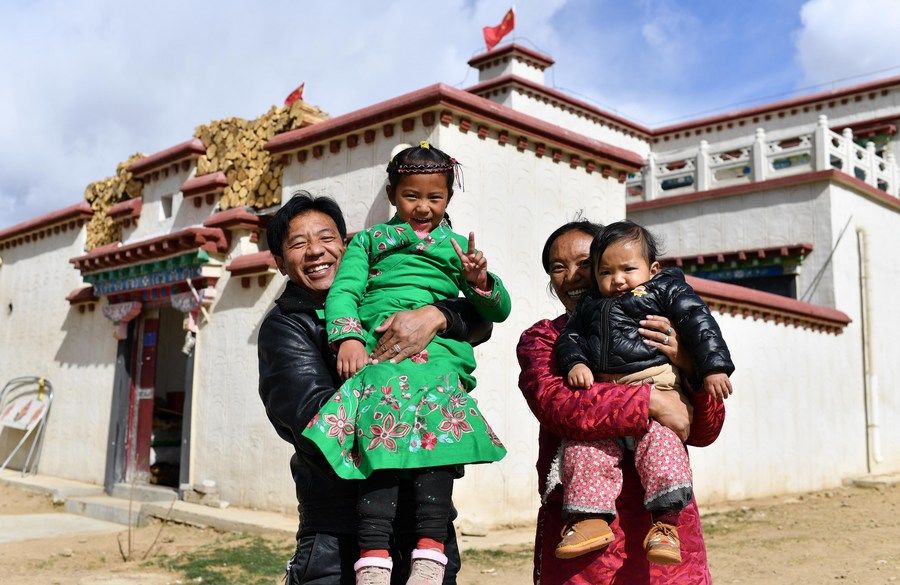rog|Xi Focus: 70 years on, Tibet embarks on new journey of modernization
-- China's Tibet Autonomous Region is celebrating the 70th anniversary of peaceful liberation -- a turning point in the region's history -- as it starts a new journey of modernization after decades of leapfrog development.
-- In just a few decades, the Communist Party of China has united and led the people of all ethnic groups in Tibet to make unprecedented historical achievements.
-- Efforts must be made to build a new, modern, socialist Tibet that is united, prosperous, culturally advanced, harmonious, and beautiful, Xi Jinping has said.
by Xinhua writers Shen Hongbing, Zhang Jingpin, Liu Xinyong, Xia Xiao
LHASA, Aug. 18 (Xinhua) -- China's Tibet Autonomous Region is celebrating the 70th anniversary of peaceful liberation -- a turning point in the region's history -- as it starts a new journey of modernization after decades of leapfrog development.
With the peaceful liberation in 1951, the people of Tibet broke free from the fetters of invading imperialism for good, and embarked on a bright road of unity, progress and development.
In late July, Xi Jinping, general secretary of the Communist Party of China (CPC) Central Committee, Chinese president and chairman of the Central Military Commission, visited the region to extend congratulations on the occasion, the first time in the history of the Party and the country.
"It has been proved that without the CPC, there would have been neither New China nor new Tibet," Xi said during the visit. "The CPC Central Committee's guidelines and policies concerning Tibet work are completely correct."

文章插图
Decorations for the Spring Festival and the Tibetan New Year are seen in front of the Potala Palace in Lhasa, capital of southwest China's Tibet Autonomous Region, Feb. 8, 2021. (Xinhua/Chogo)
HISTORIC CHANGES
Thubten Gyaltsen, 81, clearly remembers his miserable days in old Tibet and has witnessed the great transformation of the region.
"My parents were serfs and we could barely fill our stomach," he said.
In old Tibet, the three major stakeholders -- officials, aristocrats and higher-ranking lamas -- and their agents, made up about 5 percent of the population but owned almost all of the land and most of the livestock. Serfs and slaves had no means of production or freedom of their own and were subjected to exploitation and oppression.
【 rog|Xi Focus: 70 years on, Tibet embarks on new journey of modernization】In 1959, democratic reform was launched and feudal serfdom was finally abolished in Tibet. A million serfs and slaves were emancipated.
Now, Thubten Gyaltsen and his family live in a two-story house with 13 rooms and a garage in the city of Xigaze. Five in his family of six enjoy wages or pension.
"Our lives couldn't be happier, and we are experiencing a totally different world compared with the old days," Thubten Gyaltsen said.

文章插图
Nijia (1st L) and his family members pose for a photo in front of their house at the Rongma relocation settlement, a local poverty alleviation project, in Gurum Township of Lhasa, capital of southwest China's Tibet Autonomous Region, April 2, 2020. (Xinhua/Zhan Yan)
Over the past 70 years, the central government has introduced many favorable policies for the region, covering tax and finance, infrastructure, industrial development, education, health, cultural preservation and environmental protection.
Since 1978, the CPC Central Committee has held seven national meetings on Tibet to adopt major decisions and plans for the region.
"We must make improving people's livelihoods and rallying public support the starting points and ultimate goals for economic and social development," said Xi at the seventh Central Symposium on Tibet Work in August 2020.
以上关于本文的内容,仅作参考!温馨提示:如遇专业性较强的问题(如:疾病、健康、理财等),还请咨询专业人士给予相关指导!
「辽宁龙网」www.liaoninglong.com小编还为您精选了以下内容,希望对您有所帮助:- mt 波尔表将举办AeroGMT II展售会,让表迷一览腕表匠心独运的技术
- AblohVirgil Abloh呈现路易威登Aerogram男士皮具系列
- Focus 新的潮流好好把握 时髦就玩叠着穿
- 时计 ROGERDUBUIS罗杰杜彼:王者系列星际镂空腕表,纯白色的时计艺术杰作
- 披荆斩棘 魅力型格 张晋佩戴Roger Dubuis罗杰杜彼腕表
- 系列奢侈品媒体|张晋佩戴Roger Dubuis罗杰杜彼腕表|奢华奢侈媒体
- 系列 Christopher John Rogers 2022度假系列,挑战时尚的短暂周期
- 技艺奢侈品媒体|王源佩戴Roger Dubuis罗杰杜彼腕表|奢华奢侈媒体
- 方形街拍时刻 x Roger Vivier | 以经典的方形锁扣,诠释如梦如幻的法式浪漫……
- 品牌 街拍时刻 x Roger Vivier | 以经典的方形锁扣,诠释如梦如幻的法式浪漫……
